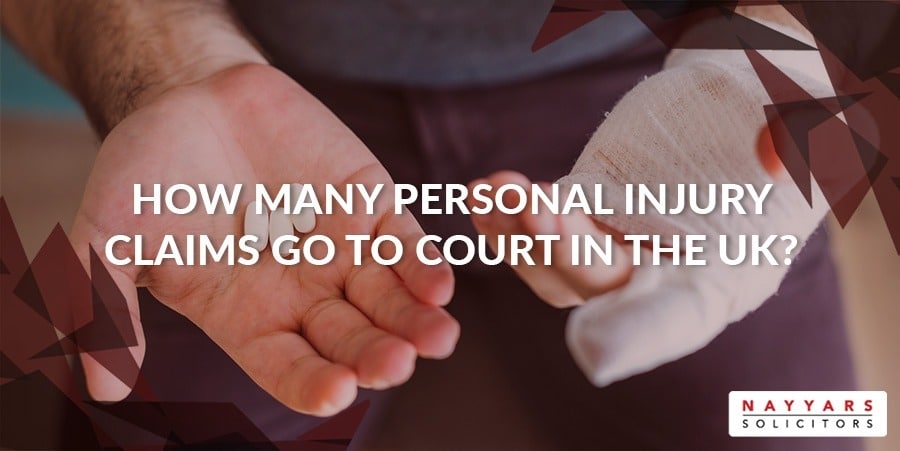LAW SOCIETY EXCELLENCE AWARDS 2019 WINNER!
How Many Personal Injury Claims Go to Court in the UK?

If you are considering pursuing a personal injury claim, the prospect of having to go to court may give you pause for thought. After all, most people spend their lives trying to avoid stepping into the courtroom, but should you expect to spend any time in the witness box?
In this article, we are going to explore just how many claims end up in court and what can be done to give yours the best chance of avoiding a judge. We will also share what you should expect if court proceedings look inevitable.
How Many Personal Injury Claims Go to Court?
When it comes to pursuing a personal injury claim, the goal should always be to reach a settlement out of court. That way the claim can be resolved as quickly as possible and you can keep your legal costs to a minimum.
You will be glad to hear, then, that the vast majority of personal injury claims are successfully settled out of court. In fact, only around 5% of personal injury claims go to court before a judge.
Why Are Most Compensation Claims Settled Out of Court?
The reason that only a small number of claims go to court is because most are pursued by solicitors on behalf of their clients. Claims that are pursued by solicitors are done so because they are judged to have a high chance of success. Therefore, it is no surprise that most are settled.
The other reason most personal injury claims do not go to court is because doing so is an expensive process that neither party wants to pay for. In fact, in many cases the defendant will settle even if they think they are in the right, simple to avoid the cost and distraction of having to go to court.
How Do You Know When to Settle?

If you have been offered a settlement as part of your claim, you may be unsure whether to agree to it. In an ideal world, you would be offered the full amount of damages you are seeking, but this is not always the case.
Instead, the defendant may offer you a reduced sum on the basis that they dispute some or all of your claim. They may even offer you a settlement simply to resolve the dispute, but not admit fault.
When offered a reduced sum, your initial instinct may be to reject it out of hand. Before you do, though, you should way up whether accepting a reduced settlement is a better or worse deal than stomaching the additional cost and time of going to court.
In many cases, it makes more sense to accept a settlement, since it allows you to avoid the extensive legal fees of going to court. If the settlement offer is too low, consider a counter-offer. Even if this is not successful, you will demonstrate to the court that you have attempted to reach a resolution outside of court, which is positive.
Of course, if you are using a solicitor to pursue your claim, you will be able to lean on their expertise and experience when deciding whether to accept a settlement offer.
Why Do Claims Go to Court?
While most claims are settled out of court, you have to prepare for the possibility that yours will need to go before a judge. A claim will go to court usually for one of the following reasons:
- Case complexity: Some personal injury claims are inherently more complex than others. Serious injuries or those with complex medical considerations can be more likely to reach court.
- Unresponsive defendant: If you are unlucky enough to be dealing with a defendant or insurer that does not want to communicate reaching a settlement may not be possible.
- Interim payments: While working towards a settlement, you may apply to court for interim payments to cover any costs of urgent treatments or living expenses.
What Happens If Your Claim Does Go to Court?

If you and the defendant are unable to reach a settlement, the next step is to commence court proceedings. However, even this does not guarantee court action.
Issuing court proceedings is a strong statement of intent and may be all that is needed to convince the other party to come to the table. As such, your solicitor will continue to press for a settlement to conclude the claim as quickly as possible.
Where court action is inevitable, whether or not you need to attend in person will depend on the value of the claim. For those that are estimated at between £1,000 and £25,000 then your appointed solicitor or barrister will represent you.
If the claim value is more than this then you may be expected to attend to answer questions about how your injury was incurred.
How Long Does it Take for a Claim to be Settled at Court?
Alongside the cost, one of the major benefits of avoiding court is reducing the time it takes to conclude your claim. If it does have to go to court, though, it is important to set your expectations for how long it will take.
Typically, you should expect your claim to take anywhere from nine to twelve months to be concluded. However, this can take a shorter or longer amount of time depending on the value of your claim and the complexity of the case.


